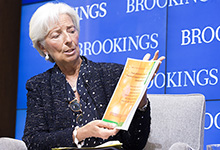
Typical street scene in Santa Ana, El Salvador. (Photo: iStock)
IMF Survey : From Ambition to Reality: Policies to Support Sustainable Development Goals
September 22, 2015
- Economic diversification can increase growth over time
- Inclusive Policies needed to sustain growth and spread the benefits equitably
- Getting fossil fuel energy prices right is key for environmental sustainability
Countries should drive their own development, but working together, the international community can turn the picture of sustainable development envisaged by the Sustainable Development Goals from aspiration into reality, says IMF Managing Director Christine Lagarde.

IMF Managing Director Christine Lagarde at Brookings Institution said working together, the international community can turn sustainable development into reality (IMF photo)
SUSTAINABLE DEVELOPMENT GOALS
In a discussion at the Brookings Institution on the 17 new Sustainable Development Goals that will be adopted on Friday at the United Nations, Lagarde noted; “countries out of their own determination can make a difference in achieving the SDGs. They do not have to wait for institutions, partners and others to make a difference.”
Meanwhile, IMF staff have published a research paper with some policy advice they believe will help countries hit targets set out by the ambitious development agenda over the course of the next 15 years. The study notes that “policies that foster economic transformation, economic and social inclusion, and protect the environment are of paramount importance for sustainable development.”
A holistic approach
While good policy decisions can reinforce synergies between economic, social, and environmental objectives, the authors say the trade-offs and challenges that individual countries face in pursuing their development goals vary significantly, with the right mix of policies depending on such factors as economic structure, levels of income and education, and institutional capacity.
Transform and diversify
The paper, “From Ambition to Execution: Policies in Support of Sustainable Development Goals,” examines the case for promoting economic diversification through structural reforms. “In a stable macroeconomic environment, structural reforms can play a crucial role in facilitating the shift of resources to their most productive uses and help to diversify production and exports.”
By diversifying their economy, the authors say developing countries can shift workers from low productivity agriculture into higher productivity sectors like manufacturing, trade and services, which create higher paying jobs in the long term and help improve living standards.
Most commodity exporting countries however, have been struggling to diversify—especially with the weakening commodity sector—and the paper commends Indonesia, Malaysia, and Mexico for having managed to move away from oil production by improving the business environment and supporting workers in acquiring relevant skills.
Making growth more durable
The study stresses the importance of economic and social inclusion, saying all levels of society—men and women equally—should benefit from economic growth. “Financial inclusion is a key ingredient for reducing income inequality, and for providing women with greater economic opportunities,” the paper notes. It also suggests that by increasing tax revenues, cutting wasteful spending and strengthening the efficiency of public service delivery, developing countries could increase social spending to help them achieve their redistributive goals. The paper says a fair tax system also plays an important role in improving equity.
Investing in a sustainable climate will mitigate risk
The study highlights the potential benefits of reducing poorly-targeted energy subsidies. It notes that raising energy prices to reflect actual cost would cut global carbon emissions by a quarter, air pollution related deaths by three-fifths, and yield revenues of up to 8 percent of GDP on average in some countries. “Pricing policies accompanied by regulations can also play an important role in the more efficient management of water resources, improving both economic prospects and the welfare of populations vulnerable to chronic and crisis-related lack of water access. Finally, financial sector policies can contribute to mitigating the impact and adapting to the consequences of adverse climate-related events,” the paper says.
With the rise in frequency of natural and public health disasters, the IMF recently created the Catastrophe Containment and Relief Trust, and increased access for low-income and developing countries to zero-interest loans to buffer potentially disruptive shocks, while they pursue their sustainable development agendas.


